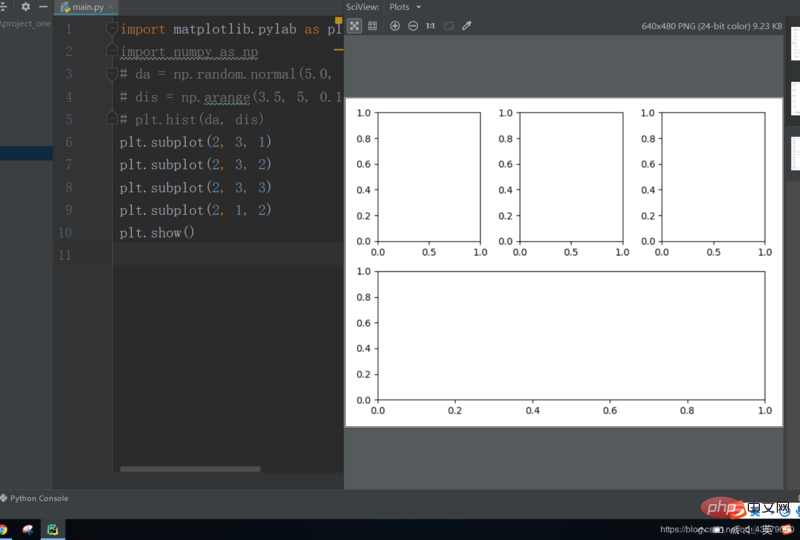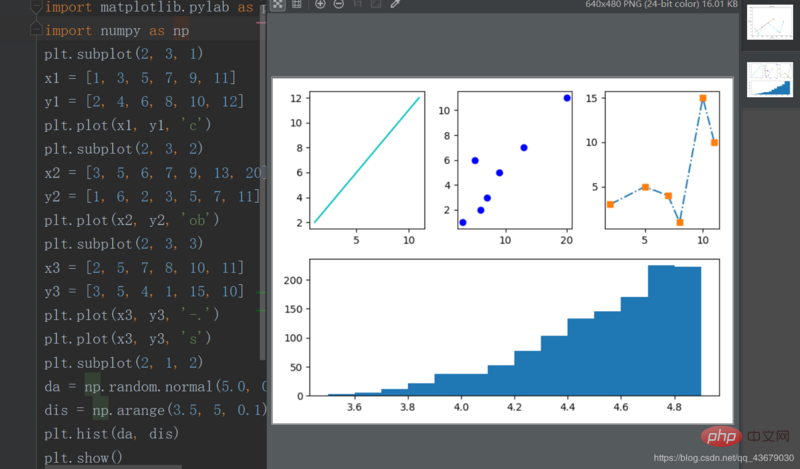 Backend Development
Backend Development
 Python Tutorial
Python Tutorial
 Analysis of methods for drawing histograms and subgraphs in Python (code example)
Analysis of methods for drawing histograms and subgraphs in Python (code example)
Analysis of methods for drawing histograms and subgraphs in Python (code example)
The content of this article is about the analysis of the method of drawing histograms and subgraphs in Python (code examples). It has certain reference value. Friends in need can refer to it. I hope it will be helpful to you.
1. The drawing of histograms also requires the use of pylab under matplotlib, but when drawing line charts we use plot(), and when drawing histograms we need to use hist() . Due to the lack of real data in the drawing process, I use the random numbers generated by np.random.normal(a,b,c) to draw the histogram. a is the mean, b is the standard deviation, and c is the number of generated data. . Use np.arange(a,b,c) to determine the range and spacing of the x-axis of the histogram. a is the minimum value, b is the maximum value, and c is the spacing. Use plt.hist(a,b) to draw, a is the data, b is the characteristic of the histogram, which is optional.
import matplotlib.pylab as plt import numpy as np da = np.random.normal(5.0, 0.5, 3000) dis = np.arange(3.5, 5, 0.1) plt.hist(da, dis) plt.show()
2. When drawing a subplot, we need to divide the space into several parts first. In this case, we need to use the command plt.subplot(a,b,c), where a represents the row, b represents the column, and c Represents the current area starting from the first line and counting from left to right to c. For example, if you want to draw three subplots in the first row and one subplot in the second row, you need to use the following code
import matplotlib.pylab as plt import numpy as np plt.subplot(2, 3, 1) plt.subplot(2, 3, 2) plt.subplot(2, 3, 3) plt.subplot(2, 1, 2) plt.show()

3. After the area splitting is completed, how should we draw the corresponding image in each area? We used the code to split the area into four parts earlier. If we want to draw in a certain area, we only need to write the drawing code under the code of that part.
import matplotlib.pylab as plt import numpy as np plt.subplot(2, 3, 1) #下面的语句绘制第一个子图 x1 = [1, 3, 5, 7, 9, 11] y1 = [2, 4, 6, 8, 10, 12] plt.plot(x1, y1, 'c') plt.subplot(2, 3, 2) #下面的语句绘制第二个子图 x2 = [3, 5, 6, 7, 9, 13, 20] y2 = [1, 6, 2, 3, 5, 7, 11] plt.plot(x2, y2, 'ob') plt.subplot(2, 3, 3) #下面的语句绘制第三个子图 x3 = [2, 5, 7, 8, 10, 11] y3 = [3, 5, 4, 1, 15, 10] plt.plot(x3, y3, '-.') plt.plot(x3, y3, 's') plt.subplot(2, 1, 2) #下面的语句绘制第四个子图 da = np.random.normal(5.0, 0.5, 3000) dis = np.arange(3.5, 5, 0.1) plt.hist(da, dis) plt.show()

The above is the detailed content of Analysis of methods for drawing histograms and subgraphs in Python (code example). For more information, please follow other related articles on the PHP Chinese website!

Hot AI Tools

Undresser.AI Undress
AI-powered app for creating realistic nude photos

AI Clothes Remover
Online AI tool for removing clothes from photos.

Undress AI Tool
Undress images for free

Clothoff.io
AI clothes remover

Video Face Swap
Swap faces in any video effortlessly with our completely free AI face swap tool!

Hot Article

Hot Tools

Notepad++7.3.1
Easy-to-use and free code editor

SublimeText3 Chinese version
Chinese version, very easy to use

Zend Studio 13.0.1
Powerful PHP integrated development environment

Dreamweaver CS6
Visual web development tools

SublimeText3 Mac version
God-level code editing software (SublimeText3)

Hot Topics
 PHP and Python: Different Paradigms Explained
Apr 18, 2025 am 12:26 AM
PHP and Python: Different Paradigms Explained
Apr 18, 2025 am 12:26 AM
PHP is mainly procedural programming, but also supports object-oriented programming (OOP); Python supports a variety of paradigms, including OOP, functional and procedural programming. PHP is suitable for web development, and Python is suitable for a variety of applications such as data analysis and machine learning.
 Choosing Between PHP and Python: A Guide
Apr 18, 2025 am 12:24 AM
Choosing Between PHP and Python: A Guide
Apr 18, 2025 am 12:24 AM
PHP is suitable for web development and rapid prototyping, and Python is suitable for data science and machine learning. 1.PHP is used for dynamic web development, with simple syntax and suitable for rapid development. 2. Python has concise syntax, is suitable for multiple fields, and has a strong library ecosystem.
 PHP and Python: A Deep Dive into Their History
Apr 18, 2025 am 12:25 AM
PHP and Python: A Deep Dive into Their History
Apr 18, 2025 am 12:25 AM
PHP originated in 1994 and was developed by RasmusLerdorf. It was originally used to track website visitors and gradually evolved into a server-side scripting language and was widely used in web development. Python was developed by Guidovan Rossum in the late 1980s and was first released in 1991. It emphasizes code readability and simplicity, and is suitable for scientific computing, data analysis and other fields.
 Python vs. JavaScript: The Learning Curve and Ease of Use
Apr 16, 2025 am 12:12 AM
Python vs. JavaScript: The Learning Curve and Ease of Use
Apr 16, 2025 am 12:12 AM
Python is more suitable for beginners, with a smooth learning curve and concise syntax; JavaScript is suitable for front-end development, with a steep learning curve and flexible syntax. 1. Python syntax is intuitive and suitable for data science and back-end development. 2. JavaScript is flexible and widely used in front-end and server-side programming.
 How to run sublime code python
Apr 16, 2025 am 08:48 AM
How to run sublime code python
Apr 16, 2025 am 08:48 AM
To run Python code in Sublime Text, you need to install the Python plug-in first, then create a .py file and write the code, and finally press Ctrl B to run the code, and the output will be displayed in the console.
 Where to write code in vscode
Apr 15, 2025 pm 09:54 PM
Where to write code in vscode
Apr 15, 2025 pm 09:54 PM
Writing code in Visual Studio Code (VSCode) is simple and easy to use. Just install VSCode, create a project, select a language, create a file, write code, save and run it. The advantages of VSCode include cross-platform, free and open source, powerful features, rich extensions, and lightweight and fast.
 Can visual studio code be used in python
Apr 15, 2025 pm 08:18 PM
Can visual studio code be used in python
Apr 15, 2025 pm 08:18 PM
VS Code can be used to write Python and provides many features that make it an ideal tool for developing Python applications. It allows users to: install Python extensions to get functions such as code completion, syntax highlighting, and debugging. Use the debugger to track code step by step, find and fix errors. Integrate Git for version control. Use code formatting tools to maintain code consistency. Use the Linting tool to spot potential problems ahead of time.
 How to run python with notepad
Apr 16, 2025 pm 07:33 PM
How to run python with notepad
Apr 16, 2025 pm 07:33 PM
Running Python code in Notepad requires the Python executable and NppExec plug-in to be installed. After installing Python and adding PATH to it, configure the command "python" and the parameter "{CURRENT_DIRECTORY}{FILE_NAME}" in the NppExec plug-in to run Python code in Notepad through the shortcut key "F6".





